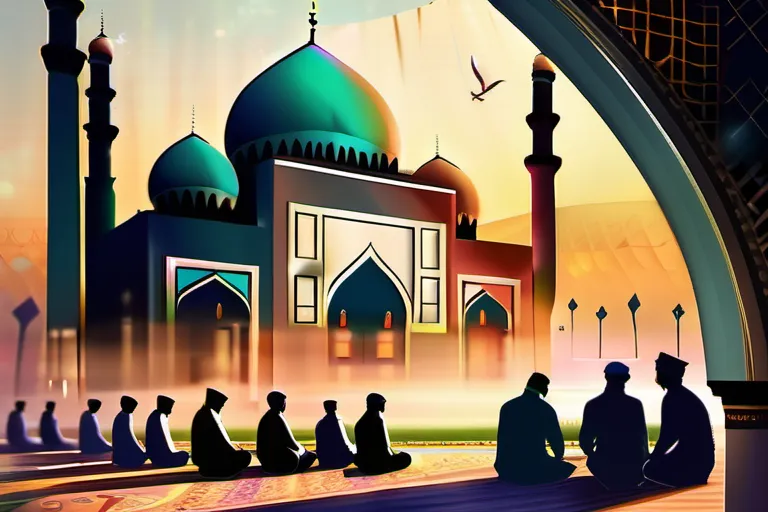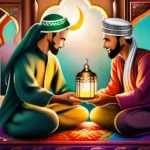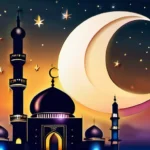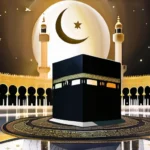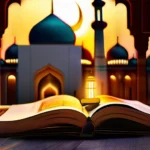Explore the religious, historical, and cultural significance of Eid al-Adha, one of Islam’s most important holidays.
Eid al-Adha, also known as the Feast of Sacrifice, is a significant holiday in Islam that marks the end of the Hajj pilgrimage. In this article, we delve into the religious, historical, and cultural significance of Eid al-Adha, providing a comprehensive understanding of its importance to Muslims worldwide.
The Historical Significance of Eid al-Adha
Imagine a tale from the annals of history, where faith and sacrifice intertwine to create one of Islam’s most revered holidays—Eid al-Adha. In this narrative, we explore the historical significance of Eid al-Adha, focusing on the profound story of Prophet Ibrahim (Abraham) and his son Ismail.
One cold morning, as dawn breaks over a barren land, a voice resounds in Ibrahim’s dreams: ‘Take your son to a mountain for sacrifice.’ This command from God is not just a test but a journey that would forever change the course of history. The journey symbolizes the arduous path of faith and submission. Can you imagine the courage it took for Ibrahim to embark on this perilous mission?
The duo sets out, leaving behind their homeland for an unknown destination. As they journey forth, Ibrahim’s trust in God grows stronger with each step. The mountain, where they eventually reach, is not just a geographical landmark but a metaphorical summit of faith. Here, the sacrifice becomes a test of unwavering devotion and obedience.
But what makes this story truly remarkable is its timeless message: the value of a father’s love for his son and God’s profound trust in humanity. The act of sacrificing Ismail, whom God substitutes with a ram at the last moment, underscores the importance of faith over literal acts. This event becomes a symbol of resilience, where even the most unlikely situations can turn out favorably through divine intervention.
The lesson from this story is as relevant today as it was centuries ago. It teaches us that our journey in life should be guided by faith and that sometimes, we are tested to prove our commitment. The historical significance of Eid al-Adha lies not only in its narrative but also in the enduring lessons it imparts about sacrifice, trust, and perseverance.
The Religious Significance of Eid al-Adha
Imagine standing before your maker, willing to sacrifice everything you hold dear—would you be prepared? This is the profound question posed by Eid al-Adha, one of Islam’s most revered holidays. The story of Prophet Ibrahim (Abraham in Christianity and Judaism) serves as a poignant reminder of faith’s ultimate expression.
According to Islamic tradition, Allah tested Ibrahim’s unwavering commitment to God. In a moment that echoes the depths of divine trust, Allah commanded Ibrahim to sacrifice his son Ismail. This trial was not just about obedience; it was a test of faith in its purest form. Can you imagine placing your child on an altar, knowing full well the command comes directly from the heavens? The gravity of this act is immense and serves as a powerful metaphor for the sacrifices we make in our lives.
Ibn Kathir, a renowned Islamic scholar, writes that when Ibrahim was ready to obey, he saw a ram slaughtered instead of his son. This miraculous substitution symbolizes divine intervention and the preservation of familial bonds, which are cherished by every parent. The story is a testament to the balance between submission to Allah’s will and cherishing one’s loved ones.
The ritual of Qurbani, or sacrifice, during Eid al-Adha reenacts this act of faith. Muslims around the world partake in this tradition, offering their livestock to be slaughtered in memory of Ibrahim’s sacrifice. It is a stark reminder that even our possessions are secondary to our commitment to Allah. By sharing the meat with family, friends, and the less fortunate, we honor Ibrahim’s spirit of generosity and selflessness.
As you reflect on these stories and rituals, ponder: What sacrifices have you made for your faith? How can you emulate Prophet Ibrahim’s dedication in your daily life? Eid al-Adha is not just a celebration but a call to action, urging us to test our own beliefs and reaffirm our commitment to Allah.
The Cultural Significance of Eid al-Adha
The cultural significance of Eid al-Adha goes far beyond religious observance, weaving through the fabric of Islamic societies in unique and vibrant ways. Imagine a mosaic where each piece represents a different region; you can see how the patterns and colors blend to create something beautiful yet distinct.
In Middle Eastern countries, the festival is marked by communal gatherings at mosques followed by feasts with family and friends. Families often bring slaughtered sheep or goats, representing the sacrifice of Ibrahim (Abraham) in his unwavering faith. These gatherings serve as a reminder of unity and togetherness, much like how threads come together to form a strong tapestry.
In Africa, the celebration is characterized by traditional dances and musical performances. People wear their finest clothes, adorned with intricate embroidery and gold jewelry, reflecting the community’s pride and heritage. The slaughtering of animals here symbolizes not only submission but also abundance and prosperity, as the meat is distributed among families and those in need.
In South Asia, Eid al-Adha traditions include elaborate feasts and sharing of meals with neighbors and friends. The atmosphere is filled with joy and laughter, as families exchange gifts and blessings. The concept of sacrifice is honored through the charitable distribution of meat among the less fortunate, embodying the essence of giving back to the community.
Each region’s unique customs not only preserve their cultural identities but also strengthen communal bonds, making Eid al-Adha a festival that resonates deeply on both personal and societal levels. It’s like a vibrant thread in an intricate tapestry, each stitch telling a story of shared values and traditions.
Through these diverse yet interconnected practices, Eid al-Adha transcends mere religious observance to become a celebration of culture, unity, and compassion. It’s a reminder that despite the vast differences in tradition, the spirit of sacrifice and brotherhood binds Muslims across the globe.
Eid al-Adha: A Symbol of Sacrifice and Brotherhood
Eid al-Adha, often referred to as the ‘Feast of Sacrifice,’ stands as one of Islam’s most profound and moving holidays. But why is this day so significant? It goes beyond mere celebrations; it delves into a core principle that defines the faith—sacrifice. Can you imagine Abraham’s willingness to sacrifice his own son, purely out of obedience to God? This act of submission and trust has become a beacon for countless Muslims worldwide.
At its heart, Eid al-Adha is a powerful reminder of the value of selflessness and faith. The sacrifice performed by Abraham symbolizes the willingness to make any kind of offering—be it time, effort, or even material possessions—for what one holds dear. This act transcends mere animal sacrifices; it’s about demonstrating devotion in every aspect of life.
Brotherhood takes center stage during this festival too. The tradition of qurban (sacrifice) is shared among the community, where each participant shares a portion of their sacrifice with the needy. This act fosters unity and compassion, making it a reminder that our bonds are not just familial but extend to every fellow human being.
In many ways, Eid al-Adha can be likened to a grand orchestra, where each participant plays a role in creating a harmonious melody of faith. The communal aspect ensures that no one feels isolated or alone, reinforcing the idea that our actions have far-reaching impacts on those around us.
This holiday isn’t just about commemorating an ancient story; it’s about living it every day. As we participate in rituals and share our blessings, we are not merely following traditions but embodying the essence of what it means to be a true believer—a person willing to make sacrifices for their faith and community.
The Global Impact of Eid al-Adha
Eid al-Adha, often referred to as the ‘Festival of Sacrifice,’ holds a profound significance that transcends national and cultural boundaries. It’s not just about commemorating Prophet Ibrahim’s willingness to sacrifice his son for Allah; it’s a celebration that unites Muslims worldwide in a shared experience of faith and unity.
Imagine standing at the grand mosques, watching as millions of pilgrims gather in Makkah during Hajj. The sheer scale of this gathering is awe-inspiring, symbolizing the interconnectedness of the Islamic community. This global convergence serves as a powerful reminder that despite our differences, we are one in our devotion to Allah and our shared commitment to brotherhood.
The act of sacrificing an animal during Eid al-Adha is a symbolic reenactment of Prophet Ibrahim’s willingness to make the ultimate sacrifice. This practice not only honors the historical event but also instills within us the virtue of selflessness and the importance of helping those in need. Through this ritual, we are reminded to reflect on our own actions and ensure that we use our resources wisely, extending a helping hand to those less fortunate.
Moreover, Eid al-Adha fosters a sense of peace and understanding among communities. As Muslims from different walks of life come together in solidarity, it creates an atmosphere where cultural barriers are broken down, and mutual respect is upheld. It’s like a collective harb, or tent, where everyone finds shelter under the umbrella of shared beliefs and values.
In essence, Eid al-Adha serves as a powerful tool for promoting peace and unity. It invites us to celebrate our diversity while emphasizing our common humanity. Through this annual pilgrimage of faith, we reaffirm our commitment to Islam, not just in its religious practices but also in the principles it upholds—love, compassion, and brotherhood.
As we partake in the rituals and festivities of Eid al-Adha, let us remember that this celebration is more than a holiday; it’s a reaffirmation of our faith and a call to action. May our actions during this time reflect the true spirit of Eid, bringing peace and understanding wherever we go.
Eid al-Adha: A Time for Reflection and Gratitude
Eid al-Adha, often referred to as the ‘Festival of Sacrifice,’ is more than just another religious holiday; it’s a profound moment for reflection and gratitude. As Muslims around the world prepare to celebrate this significant event, one cannot help but wonder: What does Eid al-Adha truly signify in our lives?
Imagine walking through a bustling marketplace, surrounded by the sights and sounds of preparation—lambs being washed, families gathering, and hearts filled with anticipation. This is more than just a scene; it’s a living testament to faith and devotion. The act of sacrifice during Eid al-Adha reminds us that every step we take in life should be a journey towards submission to Allah.
But why, you might ask, is this holiday so deeply rooted in tradition? It commemorates the willingness of Prophet Ibrahim (Abraham) to sacrifice his son Ishmael as an act of obedience to God. This powerful story serves as a reminder of the ultimate test of faith and the importance of making sacrifices for what we believe in.
The act of giving away part of one’s livestock during Eid al-Adha isn’t just about following a ritual; it’s an opportunity to distribute wealth, strengthen social bonds, and help those less fortunate. It’s like sharing a slice of your pie with someone who hasn’t had the chance to enjoy their own meal—alleviating suffering and spreading joy.
In a world often marked by division and strife, Eid al-Adha stands as a beacon of unity and brotherhood. People from different backgrounds come together in solidarity, reinforcing the idea that we are all part of one human family. It’s a reminder that despite our differences, we share common values and aspirations for peace.
So, as we embrace the spirit of Eid al-Adha, let us not just celebrate but also reflect on how we can make sacrifices in our own lives. Whether it’s time, resources, or simply kindness, may these acts bring us closer to Allah and build a stronger community.
After all, isn’t life itself a constant reminder that every moment is an opportunity for gratitude? As we partake in the festivities, let’s carry forward the message of submission, sacrifice, and solidarity—letting these values guide our actions beyond this Eid.
Conclusion
 Eid al-Adha serves as a reminder of Prophet Ibrahim’s unwavering faith and obedience to Allah. By commemorating this event, Muslims strengthen their bond with Allah, reaffirm their faith, and celebrate the virtues of sacrifice and brotherhood.
Eid al-Adha serves as a reminder of Prophet Ibrahim’s unwavering faith and obedience to Allah. By commemorating this event, Muslims strengthen their bond with Allah, reaffirm their faith, and celebrate the virtues of sacrifice and brotherhood.

